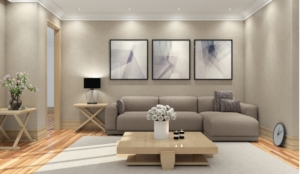The Art of Hanging Artwork

Hanging artwork is an art—literally. Too high, and the room feels off balance. Too low, and, well…you get the idea.
One of the most common mistakes homeowners make, according to Apartment Therapy’s Eleanor Büsing, is hanging pieces at the wrong level. To help you spruce up your place with properly placed artwork, Büsing offers the following tips:
Establish eye level. Eye level in most houses is approximately 57 to 60 inches from the floor. All artwork, regardless of orientation, should be hung so that the center (not the top or bottom) of the piece is at eye level.
Coordinate with orientation. The orientation of the piece—landscape (horizontal) or portrait (vertical)—should coordinate with the wall space it’ll hang on. The area above a sofa, for example, is horizontal, so the artwork should be oriented landscape.
Portraits can be hung in horizontal spaces, however—the trick is to hang them side by side so that they appear as one horizontal piece. The opposite also applies: Landscapes can be hung in vertical spaces, so long as they’re stacked one on top of the other.
Align varying sizes. A complementary duo or trio of artwork in different sizes should be hung in alignment with the pieces’ center points—this means that the tops of some pieces will be higher than others. Avoid aligning them by their tops or bottoms.
Stay uniform. Multiple pieces of artwork hung improperly can make a room seem cluttered and cramped. Make a gallery uniform by arranging the pieces in a precise grid format with matching frames, or by hanging one “anchor piece” at eye level and hanging other pieces outward from there.
Whichever of these tips you use, consistency is key. Keep eye level in mind as you hang artwork throughout your home to maintain a sense of flow

